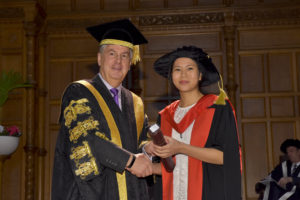Breakthrough in higher education for Bangladeshi minorities
 Adelaide-based refugee support worker Rupananda Roy has made history by becoming the first woman from one of Bangladesh’s 50 ethnic minority communities to earn a doctorate.
Adelaide-based refugee support worker Rupananda Roy has made history by becoming the first woman from one of Bangladesh’s 50 ethnic minority communities to earn a doctorate.
She recently gained her PhD in Development Studies from the University of Adelaide.
Ms Roy, an ethnic Chakma, who is part of settlement agency AMES Australia’s Humanitarian Settlement program (HSP) team in South Australia, says she is in two minds about her historic achievement.
“Of course I feel good about having achieved this – being the first woman from my community to get a doctorate – but at the same time I’m thinking why did it take so long?” Ms Roy said.
She came to Australia in 2009 on a student scholarship and has always had an interest in the area of migration.
“I have always been interested in migration; voluntary or skilled migration and also in involuntary migration which many of our clients have experienced as refugees,” Ms Roy said.
“And my PhD, which was titled ‘The Political Economy of Labour Migration from Bangladesh: Power, Politics and Contestation’, is consistent with this focus,” she said.
Ms Roy says her work with AMES Australia supporting refugees is also in keeping with this theme.
“My PhD was focused on some theoretical aspects of migration so now it’s refreshing and rewarding to be involved in the work that AMES does in providing practical support to new arrivals in Australia,” she said.
She says the choice of her thesis topic was sparked by trips back to Bangladesh.
“Whenever I would return home, I would see a large number of migrant workers queuing up at the immigration desk. We would get through easily, but they would have to wait interminably. They would be yearning to see their loved ones, and the wait was painful. I wanted to get to the bottom of this problem,” Ms Roy said.
Ms Roy’s research aimed to enhance understanding of the role of political and social factors in shaping the terms under which migrant workers are incorporated into global labour markets by examining the case of Bangladesh, one of the world’s principal migrant labour-sending countries.
The research draws on social conflict theory, arguing that Bangladesh’s migration policies and their implementation over time have reflected the continued political dominance of elites in the country.
It also looks at the effect of the patriarchal nature of Bangladeshi society and the ideological influence of Islam; as well as the structural power of foreign governments, particularly those in labour-receiving countries and those which have provided aid to Bangladesh.
The research concludes that workers’ rights would be better served by democratic reforms in labour-sending countries rather than simply through labour rights activism.
It suggests that progress on rights could be made by creating electoral incentives for politicians to pursue policies to support the poor and open up new opportunities for migrant workers’ groups to emerge, participate in and influence migration policies and their implementation.
Ms Roy said she wanted to thank her parents, her husband and her in-laws, as well as the Australian Government, for their support on her academic journey.
“My family and my husband and his family have been very supportive. Without this support, it can be quite difficult for women from my culture to pursue higher education,” she said.
Ms Roy now plans to publish further articles and perhaps a book on labour migration in collaboration with her PhD supervisor.
Outside of work and academia, Ms Roy has her hands full with her one-year-old daughter.
“I thought that my PhD would be the biggest challenge in my life. But having a child is much more challenging,” she said.
“I love spending quality time with her,” Ms Roy said.
Laurie Nowell
AMES Australia Senior Journalist












